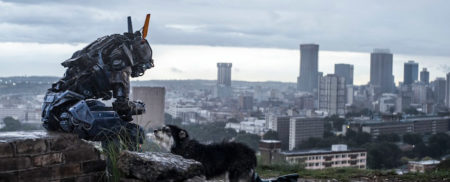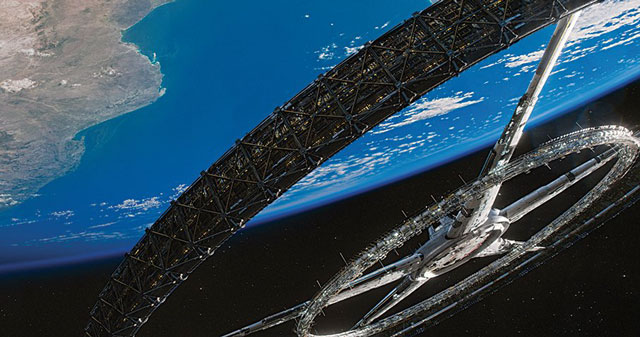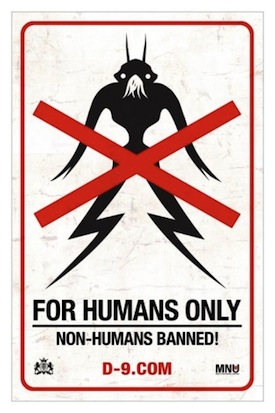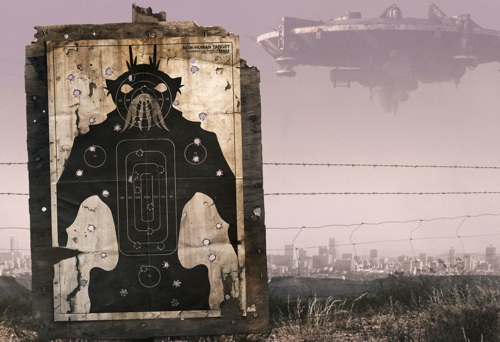
District 9, directed by Johannesburg-born Neill Blomkamp, smashes together the grimy, urban dystopias of Blade Runner and Robocop with the equally bizarre parallel universe of SABC television during the Total Onslaught years to create the most compelling science fiction film of 2009.
In District 9’s alternate history, a massive spaceship containing a race of dispirited and pitiful aliens comes to a standstill in the skies over Johannesburg in 1990. Following their rescue from the spaceship, the aliens are housed in refugee camps that quickly turn into squalid slums ruled by gangsters.
The story picks up 20 years after the appearance of the spaceship, by which time the aliens have outlived their welcome in the District 9 refugee camp. Initially told in a mock-documentary format, the film follows a mid-level operative called Wikus van de Merwe as he goes about the business of evicting the aliens from District 9 in preparation for their forced removal to a new camp.
District 9 is an allegory about apartheid and xenophobia, and not a particularly subtle one at that. Blomkamp and co-scriptwriter, Terri Tatchell, have written a smart but brash satire in the mould of Paul Verhoeven’s Starship Troopers that makes no concessions to political correctness.
It’s striking just how undiluted District 9’s SA flavour is, despite the fact that it was made with US$30 million of foreign money. District 9 shows SA filmmakers something Australians have known for years: genre films can be as effective means of telling a country’s stories as dour social realism.
Peter Jackson, the New Zealand director best known for King Kong and the Lord of the Rings trilogy, backed Blomkamp’s feature debut after the pair’s plans to make a film based on the Halo video game franchise fell through. As the producer of the film, Jackson gave Blomkamp the space to make the film that he wanted to with few obvious compromises to international tastes.
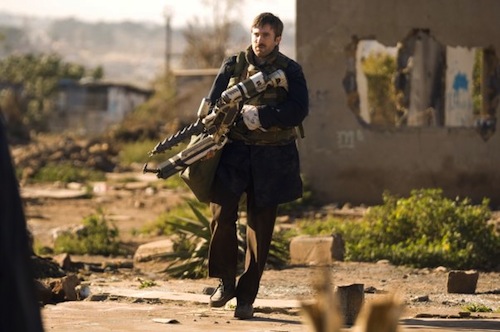
District 9 was filmed on location in Chiawelo, Soweto with an almost entirely South African cast of unknowns headed by a lead actor who has never appeared in a major feature film. None of the actors make any attempt to mask their thick SA accents and Afrikaans expletives abound.
The star of the film is Sharlto Copley as Wikus, an embodiment of the naïve but callous mid-level authority figure that was common in the apartheid years — that policeman, home affairs official or teacher whose cruelty was more rooted in ignorance and cowardice than malice.
Copley, who ad-libbed much the dialogue, initially plays Wikus for laughs as an unlikeable buffoon before growing him into a figure that the viewer can care about, though not necessarily admire. David James is chilling as Wikus’s main antagonist, a brutal private military contractor named Kobus Venter.
Wikus’s journey parallels the transformations that the lead characters in Andre Brink’s A Dry White Season and JM Coetzee’s Waiting for the Barbarians go through. It is a trip through the absurdities of pre- and post-apartheid SA life, including SABC news propaganda, xenophobia, forced removals and the Immorality Act. Like the best satire, it makes one laugh and cringe at the same time.
Jackson’s Weta Digital studio was responsible for the inspired special effects and CGI that bring Blomkamp’s vision to life. The aliens — initially repulsive before morphing into sympathetic beings as Wikus’s empathy with them grows — and the mysterious spaceship that hovers above Jo’burg rank among some of the most convincing CGI creations to date.
District 9 isn’t perfect. Blomkamp’s handling of the dramatic moments in the film is clumsy compared to his adept treatment of the action sequences and the comedy. The transition from mockumentary to out-and-out sci-fi action film is a bit abrupt, though the action scenes are so exhilarating that most viewers won’t care. It’s a self-assured debut for the 30-year old Vancouver resident, who brings the same of sort of verve and wit to the movie as John Carpenter did to his earlier films.
The risks that Blomkamp and Jackson took with District 9 have paid off -– it has already taken $90m at the US box office and ranks as one of the most critically acclaimed films of the year. Their success is richly deserved in a year that has produced glossy but vapid science fiction fare like Terminator: Salvation and Transformers 2: Rise of the Machines. — Lance Harris, TechCentral
Peter Jackson greenlighted District 9 on the strength of Neill Blomkamp’s short film, Alive in Johannesburg:


